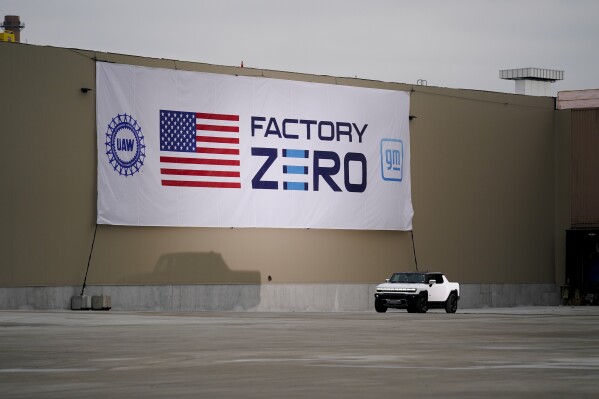DETROIT (AP) – Despite recent policy changes from President Donald Trump that have drawn criticism within the electric vehicle industry, Michigan’s EV sector remains optimistic. The state, historically the heart of American auto manufacturing, is undergoing a significant transformation as it becomes a leading destination for EV investment.
Over $27 billion is being invested in approximately 60 EV manufacturing and battery projects within Michigan. This level of investment surpasses even that of Georgia, which has $26.6 billion, according to Atlas Public Policy. This indicates that Michigan remains central to the evolution of the auto industry.
Michigan is home to many supply companies in addition to automakers. One of the key projects is General Motors’ (GM) Factory ZERO, an assembly plant that has been redesigned to produce electric Hummers and Silverados in the Hamtramck neighborhood of Detroit, an area with rich automotive history.
Other projects include a $1.6 billion battery manufacturing campus in Van Buren Township and a futuristic building in Detroit’s Corktown neighborhood. The battery campus is expected to create over 2,100 jobs and produce the equivalent of 200,000 EV battery packs annually. The Corktown building, located near the renovated Michigan Central train station, now houses Newlab, a collaborative space for entrepreneurs and automakers.
Eric Frehsée, an auto dealer, emphasized the importance of these investments even with the recent policy shifts. Frehsée, who owns Tamaroff Auto Group in Metro Detroit, is preparing his business for EVs by installing chargers and training technicians. He currently sells Nissan, Honda, Acura, and Kia vehicles, each of which now offers EV models.
On Detroit’s east side, Ray Smith leads an EV training program at Blast Detroit, where aspiring auto technicians learn to diagnose EV electrical, software, and battery systems; they then compare these systems to traditional gasoline-fueled cars.
Smith stated, “We’ve got to move forward, of course.” Trump signed an executive order that signals an intention to eliminate the EV mandate, which refers to President Joe Biden’s objective for EVs to account for 50% of new vehicle sales in the U.S. by 2030. Trump’s order also indicates he aims to roll back greenhouse gas emission rules and likely seek the repeal of the $7,500 tax credit for EV purchases.
While some automakers have scaled back their EV plans, and though EVs accounted for 8.1% of new vehicle sales in the U.S. in 2024, the rate of sales growth has slowed from the previous year, according to Motorintelligence.com. Despite the increased affordability of EVs, the upfront cost is still higher than gasoline-powered cars.
Bruce Westlake, president of the Eastern Michigan Electric Automobile Association, noted that although some customers are motivated by environmental concerns, decreased federal support for EVs and clean energy may dampen demand. Another Detroit-based company, Plug Zen, is focused on EV charging solutions for companies with vehicle fleets. CEO Q Johnson stated that the company is determined not to be left behind.
Stellantis, the manufacturer of Jeep and Ram, said in a statement it is “well positioned to adapt to the policy changes enacted by the new Administration” and that it looks forward to working with the president. Ford had no comment on the changes, and a GM spokesperson did not comment.


